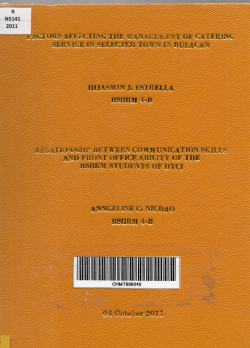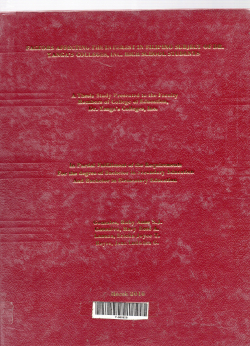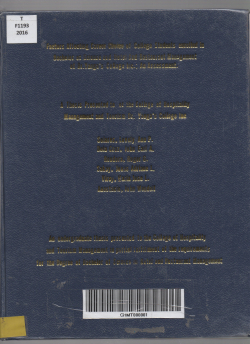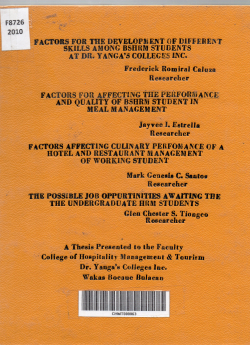Factors Affecting Waste Management of College Students of Dr.Yanga’s Colleges, Inc.

Type
Thesis
Authors
Category
CHS
[ Browse Items ]
Subject
waste management
Abstract
The problem in waste management of students is a complex one. Historically, the of waste generated by human population was insignificant mainly due to the low population densities, coupled with the fact there was very little exploitation of natural resources
There are ways in managing waste like: disposal, energy recovery, recycling,
minimization/reduce and prevention. The most widely used concepts include: “The
Hierarchy”, “Extended Producer Responsibility” and “The Polluter Pays princip1e”. Environmental Theory is incorporated with the restoration of the usual health
of the nurse’s clients into the delivery of health care. There is compelling evidence the college students of Dr. Yanga’s College, Inc. having difficulty in waste
management. The researchers decided to conduct this study about waste management it plays a big role not only for the subject’s life but for every person. This study aims to determine the factors affecting waste management of Dr.Yanga’s Colleges, Inc. This study also aims to site different ways on managing waste and how it is done to benefit not only the students but also the society by giving ideas on how an individual must manage his/her waste.
The researcher uses the descriptive method of research wherein it is the commonly used and the basic reason for carrying out descriptive research to identify the cause of something that is happening. This type of research is also a grouping that includes many particular research methodologies and procedures, such as observations, survey, self- reports, and tests. The four parameters of research will help us understand how descriptive research in general is similar to, and different from, other types of research. This is used to obtain concerning the current status of the phenomenon to describe “what exists” with respect to variables or condition in a situation. The methods involved range from the survey which describes the status, the correlation study which investigates the relationship between variables, to developmental studies which seek to determine changes over time. The researcher made the study and distribute of the questionnaire in Dr.Yanga’s Colleges Inc. where study is being done in its student.
Based on respondents’ responses: Attitude affects waste management of an individual shows that sixty percent (60%) of respondents strongly agrees that the attitude does affect waste and forty percent (40%) agrees; seventy percent (70%) of respondents fairly agrees that peers affect waste management while twenty-three (23%) are agrees and only three (3%) strongly agres; sixty-four (64%) of respondents agrees that class schedule also affect waste management, thirty-three (33%) are strongly agrees and three (3%) fairly agree; and sixty-three (63%) of respondents agrees that student prefer disposal as a way of managing their waste and thirty-seven (37%) strongly agree.
The study revealed that the attitudes, peers and class schedule of the college students of Dr.Yanga’s Colleges Inc., affect their ways to manage waste when they are in the school area or even outside the school. The percentages from the summary of findings also provides data which can proves that the alternative hypothesis that there is a significant relationship between waste management of the college students of Dr.Yanga’ s College, Inc. and the factors affecting it is accepted because it is evidenced by the subjects’ response to the survey forms provided by the researchers. Thus, the data presented also proves that the null hypothesis is rejected that there is no significant relationship between waste management of the college students of Dr.Yanga’.s College, Inc. and the factors affecting it.
There are ways in managing waste like: disposal, energy recovery, recycling,
minimization/reduce and prevention. The most widely used concepts include: “The
Hierarchy”, “Extended Producer Responsibility” and “The Polluter Pays princip1e”. Environmental Theory is incorporated with the restoration of the usual health
of the nurse’s clients into the delivery of health care. There is compelling evidence the college students of Dr. Yanga’s College, Inc. having difficulty in waste
management. The researchers decided to conduct this study about waste management it plays a big role not only for the subject’s life but for every person. This study aims to determine the factors affecting waste management of Dr.Yanga’s Colleges, Inc. This study also aims to site different ways on managing waste and how it is done to benefit not only the students but also the society by giving ideas on how an individual must manage his/her waste.
The researcher uses the descriptive method of research wherein it is the commonly used and the basic reason for carrying out descriptive research to identify the cause of something that is happening. This type of research is also a grouping that includes many particular research methodologies and procedures, such as observations, survey, self- reports, and tests. The four parameters of research will help us understand how descriptive research in general is similar to, and different from, other types of research. This is used to obtain concerning the current status of the phenomenon to describe “what exists” with respect to variables or condition in a situation. The methods involved range from the survey which describes the status, the correlation study which investigates the relationship between variables, to developmental studies which seek to determine changes over time. The researcher made the study and distribute of the questionnaire in Dr.Yanga’s Colleges Inc. where study is being done in its student.
Based on respondents’ responses: Attitude affects waste management of an individual shows that sixty percent (60%) of respondents strongly agrees that the attitude does affect waste and forty percent (40%) agrees; seventy percent (70%) of respondents fairly agrees that peers affect waste management while twenty-three (23%) are agrees and only three (3%) strongly agres; sixty-four (64%) of respondents agrees that class schedule also affect waste management, thirty-three (33%) are strongly agrees and three (3%) fairly agree; and sixty-three (63%) of respondents agrees that student prefer disposal as a way of managing their waste and thirty-seven (37%) strongly agree.
The study revealed that the attitudes, peers and class schedule of the college students of Dr.Yanga’s Colleges Inc., affect their ways to manage waste when they are in the school area or even outside the school. The percentages from the summary of findings also provides data which can proves that the alternative hypothesis that there is a significant relationship between waste management of the college students of Dr.Yanga’ s College, Inc. and the factors affecting it is accepted because it is evidenced by the subjects’ response to the survey forms provided by the researchers. Thus, the data presented also proves that the null hypothesis is rejected that there is no significant relationship between waste management of the college students of Dr.Yanga’.s College, Inc. and the factors affecting it.
Number of Copies
1
| Library | Accession No | Call No | Copy No | Edition | Location | Availability |
|---|---|---|---|---|---|---|
| Main | 562 | T p653 2011 | 1 | Yes |




